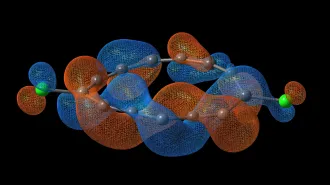The pursuit of prime numbers–integers evenly divisible only by themselves and 1–can lead to all sorts of curious results and unexpected patterns. In some instances, you may even encounter a mysterious absence of primes.
In 1960, Polish mathematician Waclaw Sierpinski (1882–1969) proved that there are infinitely many odd integers k such that k times 2n + 1 is never prime for all values of n greater than or equal to 1. A multiplier k with this property is called a Sierpinski number.
That’s a strange result. There appears to be no obvious reason why these particular expressions never yield a prime. After all, formulas of the form m times 2n + 1 nearly always eventually produce a prime, so it’s not unreasonable to expect that all such expressions would. Nonetheless, exceptions do occur, putting Sierpinski numbers in the research spotlight.
In 1962, John Selfridge discovered what remains the smallest known Sierpinski number, k = 78557. The next largest is 271129.
Is there a smaller Sierpinski number? No one knows yet. However, to establish that 78557 is really the smallest Sierpinski number, it would be sufficient to find a prime of the form k 2n + 1 for every value of k less than 78557.
Early last year, there were only 17 candidate values of k left to check: 4847, 5359, 10223, 19249, 21181, 22699, 24737, 27653, 28433, 33661, 44131, 46157, 54767, 55459, 65567, 67607, 69109.
In March 2002, Louis K. Helm of the University of Michigan and David A. Norris of the University of Illinois initiated a project they dubbed “Seventeen or Bust” (see http://www.seventeenorbust.com/). Their goal was to harness the computing power of a worldwide network of hundreds of personal computers to check for primes among the remaining candidates.
The team’s effort has now eliminated five candidates, with the latest discovery occurring on Dec. 22, 2002.
The first to go was k = 46157. On Nov. 27, 2002, project participant Stephen Gibson’s Athlon T-bird computer reported that 46157 2n + 1 is a prime when n = 698207. The prime itself has 210,186 decimal digits.
On Dec. 2, 2002, James Burt discovered that 65567 2n + 1 is a prime when n = 1013803. This prime weighs in at 305,190 decimal digits.
Three days later, the computer of a participant identified only as deviced uncovered the fact that 44131 2n + 1 is a prime when n = 995972.
On Dec. 7, Sean DiMichele’s computer reported that 69109 2n + 1 is a prime when n = 1157446. This gigantic prime runs to 348,431 digits.
In the latest discovery, Peter Coels found that 54767 2n + 1 is a prime when n = 1337827. At 402,569 digits, the newly discovered behemoth is the seventh largest prime now known.
With five Sierpinski candidates cracked in rapid succession, there are only 12 more to go. But, despite the encouraging start, it may take as long as a decade, with lots of additional participants, to finish off all of the remaining candidates and close the book on another nagging conjecture in number theory.






